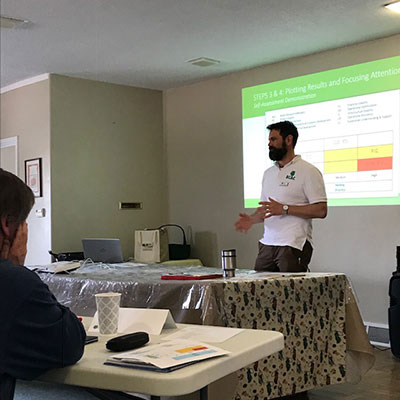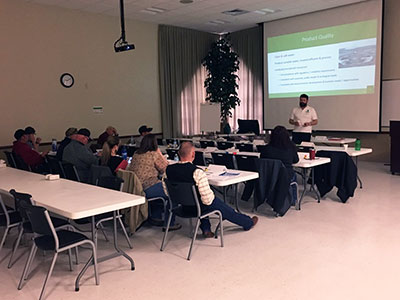By Louis Martin, RCAC staff writer

Rural Community Assistance Corporation’s long running “workshop-in-a-box” (WIAB) has recently been a source of unexpected opportunities in rural Utah.
Funded by U.S. Department of Agriculture Rural Development (USDA), RCAC created the workshops in 2012 in partnership with USDA and U.S. Environmental Protection Agency. Designed as an all-day workshop for small utility system administrators, the training looks at 10 key management areas within a utility, such as financial viability and operational resiliency. The WIAB helps utilities identify strengths and weaknesses to plan for the future.
The training also has a secondary benefit: to introduce RCAC to communities that may not know about what the organization offers. For attendees that find gaps in their 10 key management areas, RCAC may offer services to address them such as vulnerability assessments or rate studies. In the case of a recent WIAB in rural Utah, RCAC Rural Development Specialist Matthew Kennedy made connections with many new faces as the first full-time field staff to be based in Utah on RCAC’s environmental team. With the onset of the COVID-19 pandemic, all the WIAB have been converted to exclusively online.
Many of the 10 key management areas reviewed in the workshops provide trainers with an opportunity to share RCAC services, such as rate studies or emergency response plans. In a recent WIAB, no less than three small utility managers or city administrators approached Kennedy soon after to inquire about follow up technical assistance.
One such small town was Beaver City, Utah. The city manager and the town water master were impressed with Kennedy’s training and approached him after the workshop about challenges in the town’s water rate structure. The inquiry would ultimately result in a nearly yearlong rate study for the town drinking water system, which Kennedy led. The end result was a rate structure proposal to create more equity between residential and commercial water users and increase revenue. The city adopted RCAC’s rate recommendations.
Work with rural Apple Valley, Utah also came from a WIAB session. Apple Valley’s mayor and a Big Plains Water & Sewer Special Service District board member, which serves Apple Valley, contacted Kennedy shortly after attending his training. Kennedy had worked with the community in the past on a median household income survey and was familiar with the town. RCAC conducted a drinking water rate study and found that Big Plains service district’s rate structure brought in less annual revenue from water sales than was owed on its loans. The financial situation was serious, and the final rate study recommended essentially doubling the drinking water rates to make the system sustainable. Kennedy also assisted with public hearings for both Apple Valley and Beaver City. The hearings are important to allow residents to hear the proposed rate changes, why they are needed and to hear input from the community.

Finally, a water operator from Hatch, Utah got in touch with Kennedy months after the same WIAB training. Hatch had recently submitted forms for a grant request to USDA but had not included a vulnerability assessment. USDA Rural Development reached out to Hatch to request the assessment and directed the system to RCAC for help.
“That was really a case of USDA learning more about RCAC and the work we are able to do from these workshops,” Kennedy said. “There wasn’t as much relationship building that we had to do because of this training. So, it was really easy to set up a site visit, walk through the system and set up that vulnerability assessment with [the town of Hatch].”
Town officials from Hatch had not attended any WIAB, but the town still ended up commissioning RCAC for its vulnerability assessment. While RCAC has a long-standing relationship with USDA, Kennedy is RCAC’s first full-time environmental staff member to work in Utah, and he says the WIAB is a great platform to build relationships with USDA.
Currently RCAC conducts WIAB in all 13 western states, typically multiple times each year. Ironically, COVID-19 has made them more in demand than ever, and workshops are scheduled for Hawaii, Washington, Oregon and Alaska by the end of 2020.
If you are interested in finding WIAB in your area, go to the RCAC events calendar on the RCAC website for dates and locations.
